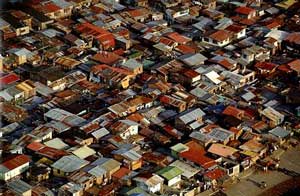 Asians and Hispanics will see the most dramatic
increases between now and midcentury, when the U.S.
population will have grown by almost 50 percent to reach
420 million, according to bureau projections being
released Thursday.
Asians and Hispanics will see the most dramatic
increases between now and midcentury, when the U.S.
population will have grown by almost 50 percent to reach
420 million, according to bureau projections being
released Thursday.
America will get older, too. Nearly 21 percent of its
residents will be age 65 or older, compared with 12
percent now.
The data highlight trends long predicted. But racial
and ethnic changes are taking shape faster than
expected, due in large part to higher-than-forecast
immigration rates for Asians and Hispanics, said Greg
Spencer, a bureau demographer.
 Whites now represent 69 percent of the population,
but their growth is slowing because of low rates of
birth and immigration. Their total will grow 7 percent
to 210 million, or 50.1 percent of the population, in
2050.
Whites now represent 69 percent of the population,
but their growth is slowing because of low rates of
birth and immigration. Their total will grow 7 percent
to 210 million, or 50.1 percent of the population, in
2050.
Those figures do not include Hispanics. The Census
Bureau counts "Hispanic" or "Latino" as an ethnicity
rather than a race, so they can be of any race,
including white.
Between 2040 and 2050, the Census Bureau expects the
non-Hispanic white population actually will decline
slightly because of a large number of expected deaths of
baby boomers, who by 2040 will be at least 76.
Meantime, the Hispanic and Asian populations are
expected to continue their explosive growth.
 The Asian population is expected to more than triple
to 33 million by 2050. Hispanics will increase their
ranks by 188 percent to 102.6 million, or roughly
one-quarter of the population.
The Asian population is expected to more than triple
to 33 million by 2050. Hispanics will increase their
ranks by 188 percent to 102.6 million, or roughly
one-quarter of the population.
"Historically, we've been a black-and-white country.
That's not true any longer, and even less true in the
future," said Roderick Harrison, a demographer with the
Joint Center for Political and Economic Studies in
Washington, which studies issues of concern to
minorities.
"A good deal of social history in the next several
decades will be reflected in how we sort that out,
whether we achieve greater degrees of equality in these
populations," he said.
The projections — the first released by the bureau
since the 2000 head count — also show a burgeoning older
population as healthier lifestyles and better medical
treatment increase longevity. By 2050, 5 percent of the
country will be 85 or older, compared with 1.5 percent
now.
"This poses very interesting challenges. Institutions
are going to be transformed — and Social Security is the
obvious one," said demographer Martha Farnsworth Riche,
a former Census Bureau director. She pointed to
education and health care as other affected areas.
 Factors such as how multiracial Americans are counted
could drastically alter these predictions, Riche and
Harrison said.
Factors such as how multiracial Americans are counted
could drastically alter these predictions, Riche and
Harrison said.
Prior census data show that most Hispanics choose
white as their race. Riche said that could be a sign
that future generations of U.S.-born Latinos would
select white and rather than Hispanic as their
background as they move further from the generation that
first immigrated to the United States.
"When you look at 2050 and possibly see a large
Hispanic population that doesn't speak Spanish anymore,
being Hispanic might be something very different from
today," Harrison said.
The bureau expects the black population will rise 71
percent to over 61 million, or about 15 percent of the
population, compared with nearly 13 percent now. Blacks
would remain the second-largest minority.
Asians would comprise 8 percent of the population in
2050, compared with 4 percent now.
"This means more of a mix of cultures and ethnic
backgrounds, said Edward Kwanhun Rim, president of the
Pacific Rim Cultural Foundation, Inc. in Barrington,
Ill., and a member of a citizen advisory panel to the
Census Bureau on the Asian population. "It will be a
more colorful and bright future — we can hope."